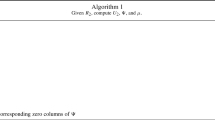Summary
In the present paper empirical influence functions (EIFs) are derived for eigenvalues and eigenfunctions in functional principal component analysis in both cases where the smoothing parameter is fixed and unfixed. Based on the derived influence functions a sensitivity analysis procedure is proposed for detecting jointly as well as singly influential observations. A numerical example is given to show the usefulness of the proposed procedure. In dealing with the influence on the eigenfunctions two different kinds of influence statistics are introduced. One is based on the EIF for the coefficient vectors of the basis function expansion, and the other is based on the sampled vectors of the functional EIF. Under a certain condition it can be proved both kinds of statistics provide essentially equivalent results.














Similar content being viewed by others
References
Besse, P. and Ramsay, J. O. (1986). Principal components analysis of sampled functions,Psychometrika, 51, 285–311.
Caussinus, H. and Ruiz, A. (1990). Interesting projections of multidimensional data by means of generalized principal component analysis.Compstat, Heidelberg: Physica-Verlag, 121–126.
Critchley, F. (1985). Influence in principal component analysis.Biometrika,72,627–636.
Japan Meteorological Agency (1999). Annual report of Automated Meteorological Data Acquisition System,Japan Meteorological Business Support Center (JMBSC).
Ramsay, J. O. and Dalzell, C. (1991). Some tools for functional data analysis (with discussion),J. Royal Statist. Soc, B53, 539–572.
Ramsay, J. O. and Silverman, B.W. (1997). Functional Data Analysis,Springer.
Sibson, R. (1979). Studies in the robustness of multidimensional scaling: Perturbation analysis of classical scaling,J. R. Statist. Soc. B 41, 217–229.
Searle, S. R. (1982). Matrix Algebra Useful for Statistics,Wiley.
Tanaka, Y. (1984). Sensitivity analysis in Hayashi’s third method of quantification,Behaviormetrika,16,31–44.
Tanaka, Y. (1994). Recent advance in sensitivity anaysis in multivariate statistical methods,J.Japanese Soc.Comp.Statist., 7, 1–25.
Tanaka, Y., and Tarumi, T. (1989). Sensitivity analysis in canonical factor analysis.J. Japanese Soc. Comp. Statist. 2, 9–20.
Tanaka, Y. and Zhang, F. (1999). R-mode and Q-mode influence analyses in statistical modelling: Relationship between influence function approach and local influence approach,Computational Statistics and Data Analysis,32,197–218.
Author information
Authors and Affiliations
Rights and permissions
About this article
Cite this article
Yamanishi, Y., Tanaka, Y. Sensitivity analysis in functional principal component analysis. Computational Statistics 20, 311–326 (2005). https://doi.org/10.1007/BF02789706
Published:
Issue Date:
DOI: https://doi.org/10.1007/BF02789706





